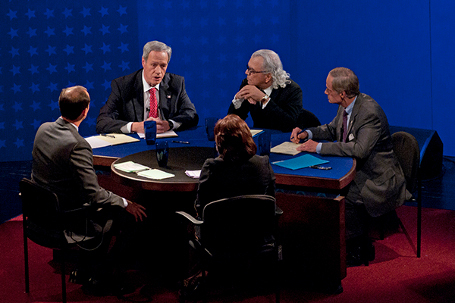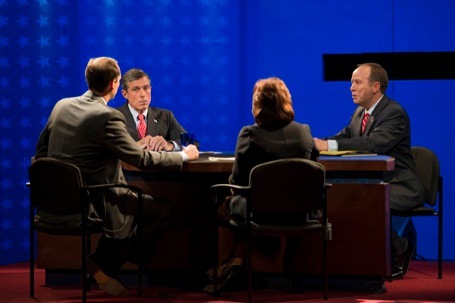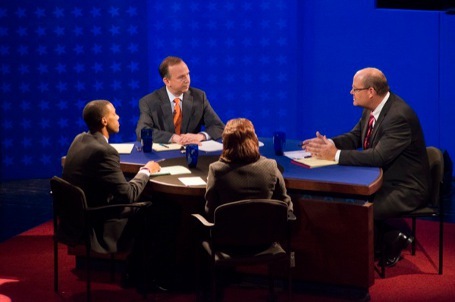Delaware Debates 2012
UD, Delaware First Media host statewide candidates in debates

The University of Delaware hosted the 2012 Delaware Debates – featuring candidates for U.S. Senate and U.S. House of Representatives on Tuesday, Oct. 16, and for governor and lieutenant governor on Wednesday, Oct. 17.
The debates were held in Mitchell Hall, which was packed with interested students, faculty and Delaware residents.
A joint initiative of Delaware First Media and the University’s Center for Political Communication made the event possible, with UD’s Ralph Begleiter, director of the center, serving as host.
“In an election season when Americans are paying huge attention to political debates at the national level, the Delaware Debates at UD proved to be a rich opportunity to help Delawareans make their voting decisions,” Begleiter said.
The debates were streamed live online by the University and on WDDE.org, allowing those not in attendance to watch.
A number of attendees – many of them students — were able to comment on the event via Twitter in designated “tweet seats” using the hashtag #DEdebates.Some viewers encouraged others to get informed: “Hey #UDEL – watch the #DEDebateslive,” like @akandez.
The U.S. Senate and House of Representatives debates, as well as those for governor and lieutenant governor, can be viewed at UD’s YouTube channel.
Oct. 16 debates

The first night, Tuesday, Oct. 16, Nancy Karibjanian, a veteran broadcaster who is vice president of Delaware First Media and also supplemental faculty in UD’s Department of Communication, and Jason Mycoff, associate professor in the Department of Political Science and International Relations, moderated the House and Senate debates.
Starting off the night with the House candidates, incumbent Democrat John Carney and Republican challenger Tom Kovach squared off over topics such as America’s presence in Afghanistan, the Affordable Care Act, the education system and stances on international allies.
In the Senate debate, incumbent Democrat Tom Carper, independent Alex Pires and Republican Kevin Wade voiced their opinions on decreasing the deficit, China’s presence in America and immigration.
@jdshan tweeted, “A little jealous of everybody covering the #DEDebates tonight. Covering O’Donnell/Coons was a highlight of my @udreview career. #memories“
Tuesday brought protesters to the audience, who were quickly removed by UD Police as the first debate got under way.
Oct. 17 debates

On Wednesday, Oct. 17, Karibjanian co-hosted with David Wilson, associate professor in UD’s Department of Political Science and International Relations.
In the evening’s opening debate, the candidates for lieutenant governor — incumbent Democrat Matt Denn and Republican Sher Valenzuela — focused on pressing local matters including the Wilmington crime rate, school funding formula, balancing the budget and recycling.
Bike paths proved to be an intense topic during the debate for governor, between incumbent Democrat Jack Markell and Republican Jeff Cragg, with the discussion also including other local points of interest such as state dependency on banks, juvenile rehabilitation and attaining capital for charter schools.
“@deteaparty You may have stolen the spotlight in the first debate, but this one is all mine. #dedebates,” @DEBikePath shared on Twitter.
Students from the University of Delaware and Delaware State University contributed to the question pool, on a variety of topics. Candidates were asked for their stance on fracking, same-sex marriage, the achievement gap, campaign spending, health insurance for students and graduate level education for students from low income families by students.
Begleiter said the debates “have been a fantastic learning opportunity for students at UD, who are seeing the national debates unfold at a distance but are able to experience formal political debates up-close right here on campus. We’ve had students working directly with candidates or with the debates producers. And our students also contributed important questions for the candidates, which were used in the Delaware Debates. These are great examples of UD’s “Discovery Learning’ student environment.”
Begleiter said that as one of the organizers of the Delaware Debates, he is “proud of the University’s role in producing these high quality political debates as a public service to our state — part of UD’s “Citizen University’ mission. Our faculty, in the departments of Communication and Political Science and International Relations, served as outstanding moderators. The Delaware Debates are just another example of UD’s role as ?the epicenter of politics.’”
Begleiter added that at UD’s Center for Political Communication, “We believe the Delaware Debates are the best in the state, and among the best in the nation. They’ve involved teamwork from many different parts of the University, from Media Services to Facilities, to Public Safety and Communications and Marketing.”
Begleiter noted that activities at UD this political season include a Nov. 1 UD Speaks program featuring Karl Rove and Robert Gibbs just a few days before the election, “Election Central” on election night when members of the campus community will be watching the outcome at the Trabant University Center, and post-election analysis on Nov. 14 with two prominent national political strategists as part of the National Agenda “Road to the Presidency” series.
The Delaware Debates received sponsorship support from the AARP of Delaware and the American Cancer Society Cancer Action Network.
